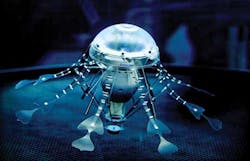Tom Freyberg
Chief Editor
Global engineering companies are investing heavily into R&D to find out how technological advancement will better the provision of services such as water. But what about “Industry 4.0" or the “Industrial Internet" and their impact?
Ask the average man (or woman) on the street what they think the terms “Industry 4.0" or the “Industrial Internet" mean and I'm sure most will look back puzzled. And rightly so. The terms of “bandwidth", “internet", “4G" and “wireless" have just about made it into the general masses' vocabulary. So what about these other phrases and what do they mean exactly? I think I found the answer, or at least the start of it, during a couple of work trips recently.
The first trip was an invite to see a German automation company's headquarters and its manufacturing operations. As a self-confessed lover of technology and gadgets (read between the lines as geek), I was amazed to see the level of technology and engineering that goes into manufacturing products that are taken for granted in water processing, such as valves. Numerous water case studies were presented on how water treatment plants are becoming more automated.
The show stealer though, was a demonstration flight of the company's SmartBird, developed as part of the Festo Bionic Learning Network in 2011. The robotic bird hovers and moves through the air like the real thing! This is part of a suite of animals designed by the company, including robotic penguins, jellyfish and its elephant trunk-like “bionic handling assistant".
Yet, what's this got to do with water, you'll most likely be asking? It's all part of the “Industry 4.0" topic many manufacturers are talking about.
The theory goes like this: humans are highly flexible and can master a variety of tasks within a very short time. Present-day machines meanwhile are often static, but can work quickly, precisely and powerfully. The challenge is combing the two worlds.
And relating the bionic animals to water equipment is relatively straightforward: the jellyfish wirelessly talk to each and share data to avoid colliding. Remind you of anything? Perhaps modern smart water meters (see page 16) that give utilities the option of monitoring variable data points on water flow and usage?
The second trip was an invite to speak about water issues on an energy-water panel debate at the World Congress for Science Journalists in Helsinki, Finland.
The phrase of the “industrial internet" was discussed, which means the convergence of machine and intelligent data.
GE believes that for power generation this will mean turbines will be able to react to changes in power demands, grid conditions and fuel supply in real time. For transport it could mean trains adjusting speed to lower fuel consumption and automatically track location. And so the list goes on.
Like with the buzzword “smart water grids", I'm suspecting that, many utilities will be sceptical about such advanced technology and ideas, at least for the time being. When it comes to water supply public, safety is the number one priority.
Risks are not taken lightly when it comes to new technologies and concepts. It is not only until results - hard facts and figures concerning money and energy savings achieved by a utility willing to take a risk – that perhaps people will take more of an interest.
I'd like to say this is a glimpse into the future. Yet we have heard how water plants in countries such as Egypt, the Philippines and Mexico have implemented the latest solutions to really modernise operations. So perhaps we are closer to the industrial internet and industry 4.0 age than we think.





